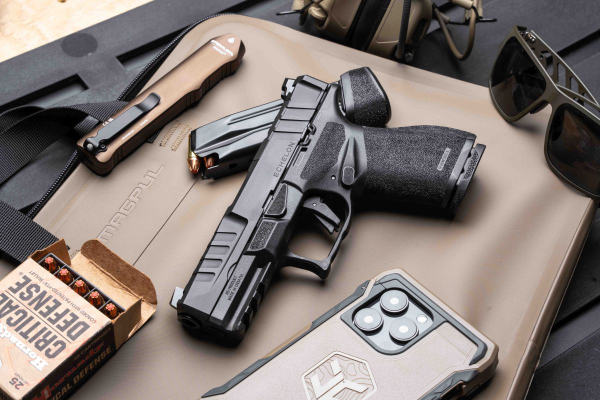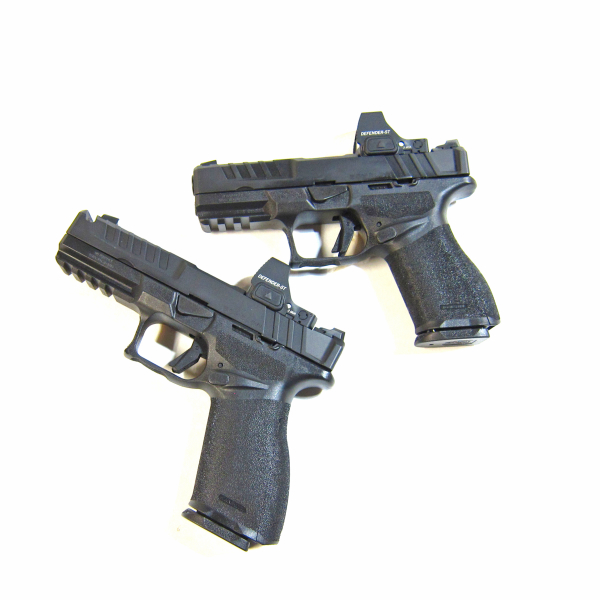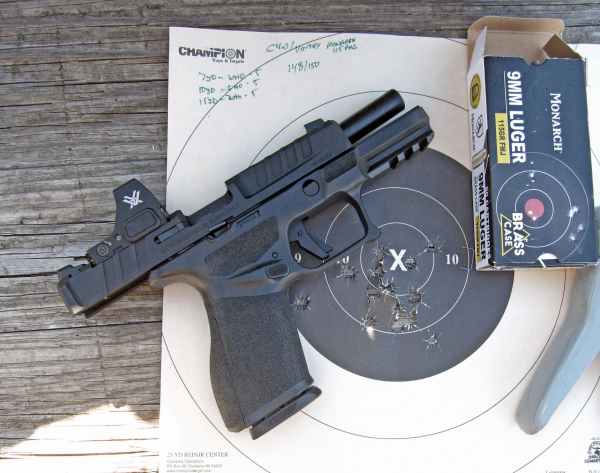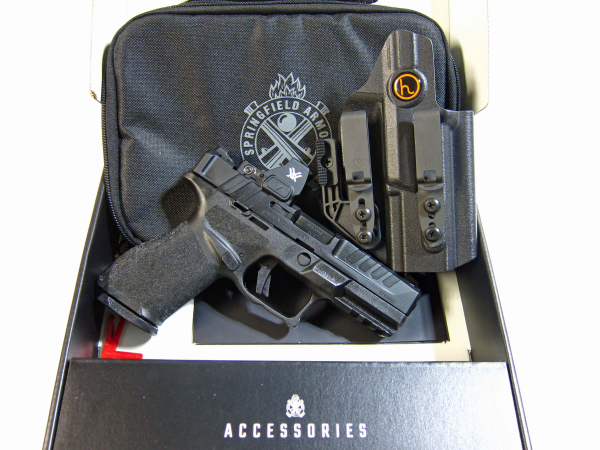It had to happen, it seemed to me; if you name something “F4.5,” naturally a “C4.0” follows. Or so I’d hoped.
The Echelon was fine and I had no complaints with the F4.5C – the compensator version of the Springfield Armory service 9mm pistol. Both worked 100%, were more accurate than they needed to be, were quite handy and ergonomic – no complaints.

But I’m retired from service. A full-sized service pistol would see little use in my world. What I needed was a compact Echelon.
Here it is. Like previous versions, the gun has a billet machined slide, Melonite finished, that is optics ready. The ½” shorter Compact barrel is hammer forged steel, likewise Melonite finished. The 1.2” wide grip surface is compact and well formed, with proper “grippy” stippling. Weighing in at 24 ounces, the gun has my much-preferred tritium/luminescent front sight and “Tactical Rack” U-Dot rear sight. It’s furnished with a pair of 15-round magazines – or with a 15-round flush magazine and an 18-round spare magazine.
Just in case.
The gun ships with the Springfield Armory double-zipper case too.
Like the Echelon F4.5/F4.5C, the new gun is tested to exceed industry-standard drop testing. If that’s not enough, the “central operating group” (their fire control parts component) has a “second sear” design. For some a critical component of a new service or carry pistol is the ability to disassemble the piece without pressing the trigger. The Echelon Compact, like its predecessors, meets that standard.
It should go without saying that, if you drop the pistol you need to let it go to the ground. Don’t try to catch it before it hits the ground. An improper grab can get a digit inside that trigger guard and closing the hand predictably presses that trigger, firing the gun.
Where is the muzzle directed in that circumstance? We’ve had people injured – and, I’m told, killed – by such attempts to prevent finish wear. The people at Springfield Armory tested the gun for drop safety. The best bet is to let it go –

I wondered about the potential difference in velocity between the Compact and the previously evaluated Echelon Comp – full-length barrel, with a comp cut into the barrel and slide.
The results follow:
|
Load |
Echelon Comp |
Echelon Compact |
|
Hornady Critical Duty 135 grain FTX +P |
1,158 fps |
1,136 fps |
|
Federal Personal Defense 124 grain Punch |
1,154 fps |
1,144 fps |
|
Remington Golden Saber 147 |
969 fps |
982 fps |
The difference is negligible. Shooting one gun against the other with the same load – using old stock Cor-Bon 90gr. JHP +P ammo, I found that -- except for blast which was greater in the F4.5 Comp -- it was virtually indistinguishable.
The new gun is shorter, making it every-so-slightly quicker to the first shot out of a holster; this is likely an inconsequential increment.
Trying the Compact on some handling drills, I found I was slow. This is more likely the human component and is no indictment on the new pistol. All hits were in the scoring rings.
Sometime later, I was able to get to a “sort-of” accuracy component with the smaller Echelon. This hurried trip featured heavier projectile 9mm loads, just what I grabbed on the way out the door.
As the range was still soggy from recent (and welcomed) precipitation, I confined myself to the more civilized bullseye bay and shot from 25 yards in a standing “with support” barricade position. While my groups weren’t small, I found the Vortex Defender ST PMO was very helpful in minimizing visual fatigue.
Shooting groups of five- and ten-shot strings, I found that the groups averaged around 4 ½” – but the best three- and best four-hits in each were considerably smaller and what one would expect from a machine rest. The “best” of these were rounded, without a noticeable tendency to stringing vertically. The “old stock” Cor-Bon 147gr. Performance Match ball ammo clustered into around 2 5/8”. The Remington Golden Saber 147gr. Brass-Jacket HP showed a 2 ¼” best effort.
The Hornady 147 grain XTP load slightly bested the others in this gun with a 1 ¾” result.
While just getting a feel for the gun, I shot on the ten-inch plate from fifty yards and hit it four times out of four attempts.
Shooting at distance with the Echelon, using the Vortex optic, made life easy.

Finally, I got to hit the range on a cold day before the holiday break. I shot the Compact on a B-8 center, starting at seven yards, moving to ten and fifteen yards. Up close, I shot one-handed with the nondominant hand. Trying to target the “X,” I conveniently forgot the offset of the dot over the bore. Not much, but it pushed the first two hits into the low “10” ring.
Moving back to seven, I tried five hits with the dominant hand only. Finally, at fifteen yards, I could use two hands. I ended up with a pair of disappointing hits in the “9” ring, but I found the Vortex optic sure made the hits easier to get. Moving to a pistol without optics – and using a timer – I had trouble staying on a larger target at similar distances. The fit, feel and frame texturing all contributed to the performance – even with low-cost Monarch-branded ammo from Academy Outdoors.

This new gun gave me the chance to try the Cipher holster from Henry Holsters. Meant for the Echelon F4.5, the longer holster body is an advantage for the Compact version. It still holds the gun capably and the longer holster body prevents the heavy-when-loaded pistol butt from tipping out away from the body.
Like certain other very good AIWB holsters, I found that I had some issues with it. That’s more of a personal issue than a holster issue, because this thing is well-thought out and well executed. Looking at the price tag tells you a lot, but looking at the finish and the extras provided with the rig fills in the remainder.
It’s slim, can be configured for left- or right-hand use and it uses the excellent Discreet Carry Concepts clips.
The mid-height sweat guard is a plus and optics pose no problems with the Cipher.
It is apparent a lot of thought went into design. It’s a good fit for the Echelon, itself a well-considered, solid service grade pistol.
— Rich Grassi